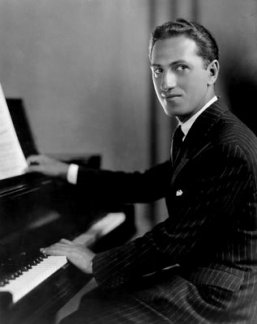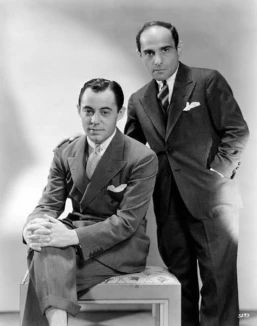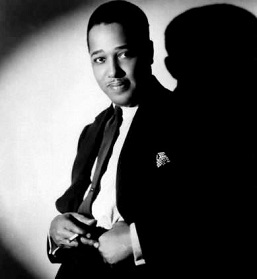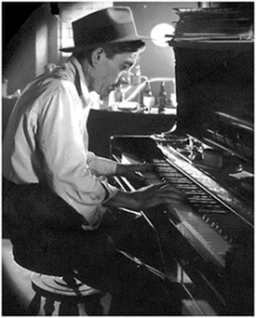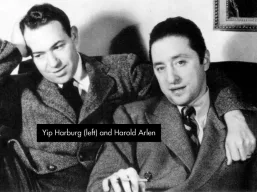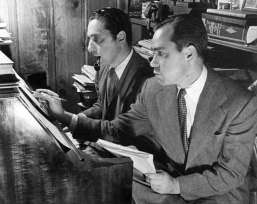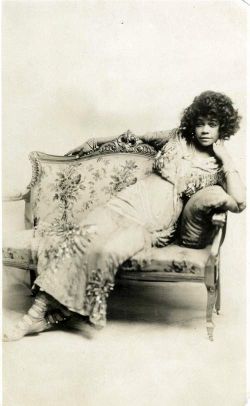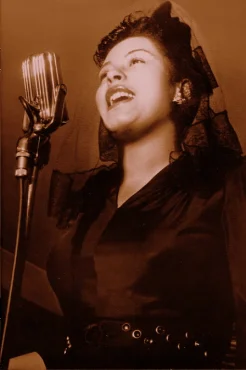1919 selected standards and hits
_______________________________
Dardanella (m. Felix Bernard and Johnny S. Black, w. Fred Fisher)
Royal Garden Blues (Clarence Williams, Spencer Williams)
Indian Summer (Victor Herbert, Al Dubin)
Mandy (Irving Berlin)
A Pretty Girl is Like a Melody (Irving Berlin)
You’d Be Surprised (Irving Berlin)
Baby Won’t You Please Come Home (Charles Warfield, Clarence Williams)
I Wish I Could Shimmy Like My Sister Kate (Clarence Williams, Armand Piron)
You Cannot Make Your Shimmy Shake on Tea (m. Irving Berlin, w. Irving Berlin, Rennold Wolf)
Swanee (George Gershwin, Irving Caesar)
Old-Fashioned Garden (Cole Porter)
- See: Swanee – selected early recordings, 1919-1920
_______________________________________
 Dardanella (m. Felix Bernard and Johnny S. Black, w. Fred Fisher)
Dardanella (m. Felix Bernard and Johnny S. Black, w. Fred Fisher)
Ben Selvin (March 5, 1898 – July 15, 1980) started his professional life at age 15 as a fiddle player in New York City night clubs. A “husky” lad, he looked older than he was and as such was permitted into such establishments. A mere six years later, as leader of his own dance band, the “Novelty Orchestra,” Selvin released the biggest-selling popular song in the first quarter-century of recorded music. Dardanella eventually sold more than 5 million copies and an additional 2 million pieces of sheet music. – adapted from the Wikipedia song profile
_____________________________
Ben Selvin’s Novelty Orchestra – recorded 20 November 1919
.
The Paul Whiteman Orchestra with Bix Beiderbecke, a featured member of the trumpet chorus — recorded 9 February 1928
__________________
Royal Garden Blues (Clarence Williams, Spencer Williams)
Original Dixieland Jazz Band – recorded 25 May 1921, New York NY
.
Bix Beiderbecke and his Gang
The Youtube provider attaches the following information:
On October 5 1927 Bix Beiderbecke recorded one of the most important jazz recordings in its history, Royal Garden Blues with his New Orleans Lucky Seven sometimes known as his Gang. Bix’s band had some superb musicians: Bill Rank, trombone; Don Murray, clarinet; Adrian Rollini, bass sax; Frank Signorelli, piano; Chauncey Moorehouse, drums.
.
Louis Armstrong and his All-Stars, Berlin – 1965
___________________
Indian Summer (Victor Herbert, Al Dubin)
Herbert wrote the tune in 1919, but the song did not become a standard until much later. Sheet music exists for Everett Hoagland and Don Reid versions, dating to 1934 and 1939 respectively, but the provenance of the second of these, at least, is doubtful, as Reid may not even have formed an orchestra until 1944.
Dubin wrote his lyric for the song in 1939 and in 1940 Tommy Dorsey’s orchestra, with vocalist Frank Sinatra, took it to number one on the American Hit Parade.
Other notable versions :
- Glenn Miller with vocalist Ray Eberle also charted in 1940 with a recording that reached #8 (according to jazzstandards.com)
- Sidney Bechet recorded in 1940 one of the first jazz versions of the tune, performing it on soprano sax
- Coleman Hawkins’ 1945
- Gene Krupa Orchestra
- Ginny Simms
- Paul Desmond
- Ella Fitzgerald
- Sarah Vaughan
Tommy Dorsey and his Orchestra – 1940– Is that Frank Sinatra singing? The provider doesn’t identify the singer, but both jazzstandards.com and Wikipedia claim that Sinatra sang the vocal on Dorsey’s hit that year. I don’t recognize the voice
.
Glenn Miller and his Orchestra, vocal: Ray Eberle – 1940
.
Sidney Bechet – 1940
.
Chet Baker Quartet — Chet Baker (t), Dick Twardzik (p), Jimmy Bond (b), Peter Littman (d)
Recorded live at Concertgebouw, Amsterdam, Saturday, 17 September 1955; released, according to Discogs.com, in the Netherlands on the 2007 album Indian Summer: The Complete 1955 Concerts in Holland, Nederlands Jazz Archief NJA0701
.
Chet Baker in Milan – 1959
.
Sarah Vaughan — 1985, according to the provider, but I’ve been unable to find anything under the title given for the laserdisc.
____________________
Mandy (Irving Berlin)
Mandy was originally used for the Army relief show called Yip Yip Yaphank during World War I (but later cut). For the number, soldiers in the show dressed in blackface and in drag. The number became a hit when it was re-used in the Ziegfeld Follies of 1919, where it was performed by Eddie Cantor and Marilyn Miller.
The song was revived in the 1954 movie White Christmas, where it was sung by Bing Crosby, Danny Kaye, and Rosemary Clooney. – Wikipedia excerpts
__________________
Al Handler & His Alamo Café Orchestra – 1926
.
A Pretty Girl is Like a Melody (Irving Berlin) – Berlin gave at various times interesting descriptions of how he came to write the song. Some of these have been collected and republished in The Complete Lyrics of Irving Berlin, 2001, p. 186.
John Steel — recorded 30 June 1919; released as Victor 1855, c/w Tulip Time (Gene Buck, Dave Stamper)
Surprisingly good quality on the vocal for 1919
.
Roy Fox & His Band (I think) with vocal by Denny Dennis — recorded 26 June 1936, issued as HMV 78 rpm single BD5082, c/w “You”
.
Django Reinhardt — recorded on 22 February 1940, in Paris — musicians: Andre Ekyan (as), Django & Joseph Reinhardt (g), Emmanuel Soudieux(b)
.
Artie Shaw – 11 June 1936
.
Mario Lanza and the Celanese Chorus on a popular radio program called The Celanese Hour– 1946
.
Enoch Light and his Orchestra at Carnegie Hall – 1962
____________________
You’d Be Surprised (Irving Berlin)
Eddie Cantor introduced the song during the New York run Ziegfeld Follies of 1919. The Complete Lyrics indicates that Berlin performed the sung in vaudeville.
Eddie Cantor — the top selling 1920 recording of the song
.
Alice Delysia – 1920
Provider footlightnotes attaches this information about the singer and the London Show in which she sang it before making this recording
Alice Delysia (1889-1979), the French actress and singer who became a star in London, here gives her own very personal rendition of Irving Berlin’s hit song, ‘You’d Be Surprised.’ This was included in Afgar, an extravaganza adapted from the French by Fred Thompson and Worton David, which was produced at the London Pavilion on 17 September 1919. Delysia recorded ‘You’d Be Surprised’ for the Columbia label (F-1043) in London on or about 9 April 1920.
.
Madeline Kahn – at Irving Berlin’s 100th Birthday Celebration – 1988
________________________
Baby Won’t You Please Come Home (Charles Warfield, Clarence Williams) – Bessie Smith’s 1923 recording was the first hit with this jazz standard.
Bessie Smith – 1923
.
McKinney’s Cotton Pickers featuring George Thomas on vocals –1930
.
Harry James with Betty Grable – I haven’t discovered the source of this clip yet. Evidently a WWII era film.
_______________
 I Wish I Could Shimmy Like My Sister Kate (Clarence Williams, Armand Piron)
I Wish I Could Shimmy Like My Sister Kate (Clarence Williams, Armand Piron)
Excerpt from Wikipedia, adapted:
“Sister Kate” is an up-tempo jazz dance song, written by Clarence Williams and Armand Piron and published in 1919. It is variously believed to be based on a bawdy tune by Louis Armstrong (about Kate Townsend, a murdered brothel madam) or transcribed from a version performed by Anna Jones and Fats Waller.
Now all the boys in the neighborhood
They know that she can shimmy and it’s understood
I know that I’m late, but I’ll be up-to-date
When I shimmy like my sister Kate
I mean, when I shimmy like my sister Kate
Bunk Johnson and his New Orleans Band — Johnson recorded the song many times with various bands in the years 1944-45 (see the Bunk Johnson discography at Weijts.scarlet.nl for details). This one seems to be from 6 December 1945, New York City, with the lineup as follows:
Bunk Johnson: trumpet
Jim Robinson: trombone
George Lewis: clarinet
Alton Purnell: piano
Lawrence Marrero: banjo
Alcide “Slow Drag” Pavageau: string bass
Warren “Baby” Dodds: drums
.
Wilbur De Paris and his New New Orleans Jazz Band at the Juan-les-Pins Jazz Festival in France, July 1960.
to be replaced
________________
Punch Miller
_______________
You Cannot Make Your Shimmy Shake on Tea (m. Irving Berlin, w. Irving Berlin, Rennold Wolf)
You cannot make your shimmy shake on tea
It simply can’t be done
You’ll find your shaking ain’t taking
The shimmy, it is intricate
And so you needs a little bit
Of Scotch or rye to lubricate your knee
Ann Gibson at the West Coast Ragtime Festival 2008. The provider says, “The Great Prohibition Follies. Ann Gibson teams up with piano master Frederick Hodges to perform this Irving Berlin tune…”
_____________________
Swanee (George Gershwin, Irving Caesar)
 Swanee was written for a New York City revue called Demi-Tasse, which opened in October 1919 in the Capitol Theater. Caesar and Gershwin, who was then aged 20, claimed to have written the song in about ten minutes riding on a bus in Manhattan, and then at Gershwin’s apartment. It was written partly as a parody of Stephen Foster’s “Old Folks at Home”. It was originally used as a big production number, with 60 chorus girls dancing with electric lights in their slippers on an otherwise darkened stage.[1]
Swanee was written for a New York City revue called Demi-Tasse, which opened in October 1919 in the Capitol Theater. Caesar and Gershwin, who was then aged 20, claimed to have written the song in about ten minutes riding on a bus in Manhattan, and then at Gershwin’s apartment. It was written partly as a parody of Stephen Foster’s “Old Folks at Home”. It was originally used as a big production number, with 60 chorus girls dancing with electric lights in their slippers on an otherwise darkened stage.[1]
The song had little impact in its first show, but not long afterwards Gershwin played it at a party where Al Jolson heard it. Jolson then put it into his show Sinbad, already a success at the Winter Garden Theatre, and recorded it for Columbia Records in January 1920.[2] “After that,” said Gershwin, “Swanee penetrated the four corners of the earth.”. The song was charted in 1920 for 18 weeks holding No. 1 position for nine.[3]It sold a million sheet music copies, and an estimated two million records. It became Gershwin’s first hit and the biggest-selling song of his career; the money he earned from it allowed him to concentrate on theatre work and films rather than writing further single pop hits. Arthur Schwartz said: “It’s ironic that he never again wrote a number equaling the sales of Swanee, which for all its infectiousness, doesn’t match the individuality and subtlety of his later works.”[4]— wikipedia , adapted
See the separate feature page:
Swanee – selected early recordings, 1919-1920
________________
Old-Fashioned Garden (Cole Porter)
 Cole Porter happened to meet Raymond Hitchcock, the producer and star of a series of Broadway revues called Hitchy-koos, aboard ship while returning from his stay in Europe during World War I. After hearing some of Porter’s songs Hitchcock engaged him to write songs for his 1919 show. Old-Fashioned Garden became Porter’s first hit. Hitchy-koo of 1919 debuted on Broadway at the Liberty Theatre on October 6, 1919 and closed on November 22, 1919, running for a total of 56 performances. The show later toured the United States.
Cole Porter happened to meet Raymond Hitchcock, the producer and star of a series of Broadway revues called Hitchy-koos, aboard ship while returning from his stay in Europe during World War I. After hearing some of Porter’s songs Hitchcock engaged him to write songs for his 1919 show. Old-Fashioned Garden became Porter’s first hit. Hitchy-koo of 1919 debuted on Broadway at the Liberty Theatre on October 6, 1919 and closed on November 22, 1919, running for a total of 56 performances. The show later toured the United States.
_____________
The vocalist may be Olive Kline
.













